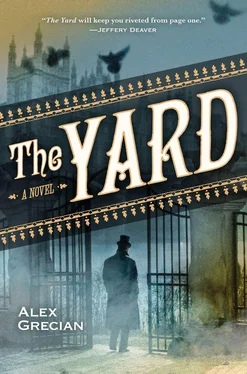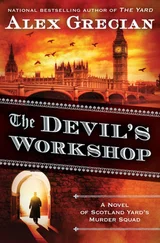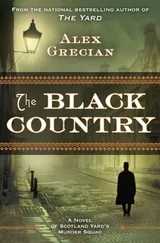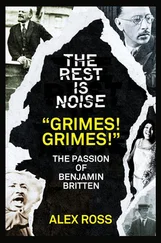Alex Grecian - The Yard
Здесь есть возможность читать онлайн «Alex Grecian - The Yard» весь текст электронной книги совершенно бесплатно (целиком полную версию без сокращений). В некоторых случаях можно слушать аудио, скачать через торрент в формате fb2 и присутствует краткое содержание. Год выпуска: 2012, Издательство: Penguin Group, Inc., Жанр: Исторический детектив, на английском языке. Описание произведения, (предисловие) а так же отзывы посетителей доступны на портале библиотеки ЛибКат.
- Название:The Yard
- Автор:
- Издательство:Penguin Group, Inc.
- Жанр:
- Год:2012
- ISBN:нет данных
- Рейтинг книги:5 / 5. Голосов: 1
-
Избранное:Добавить в избранное
- Отзывы:
-
Ваша оценка:
- 100
- 1
- 2
- 3
- 4
- 5
The Yard: краткое содержание, описание и аннотация
Предлагаем к чтению аннотацию, описание, краткое содержание или предисловие (зависит от того, что написал сам автор книги «The Yard»). Если вы не нашли необходимую информацию о книге — напишите в комментариях, мы постараемся отыскать её.
The Yard — читать онлайн бесплатно полную книгу (весь текст) целиком
Ниже представлен текст книги, разбитый по страницам. Система сохранения места последней прочитанной страницы, позволяет с удобством читать онлайн бесплатно книгу «The Yard», без необходимости каждый раз заново искать на чём Вы остановились. Поставьте закладку, и сможете в любой момент перейти на страницу, на которой закончили чтение.
Интервал:
Закладка:
“It’s honest work.”
Pringle shrugged. “It is at that. All right, I’m in.”
“You don’t need to-”
“What’s a mate for, then? I’m in it. But I’d like about three days of sleep first.”
“What about your career?”
“As long as I get to keep the uniform, I’ll be fine.”
Hammersmith grinned and finished his tea. He hardly noticed the metallic aftertaste.
15
Inspector Day walked up Northumberland Street, away from the Yard. His heels clicked on the road and echoed back from the high walls of the hotels on either side of him. There was a hole in the bottom of his left shoe, and he could feel the cold of the paving stones under his feet. The bulk of the Hotel Victoria loomed out of the fog to the left of him, and to the right the Hotel Metropole, tall and elegant. Ahead, a cab rank split the street. In the morning it would be filled with hansoms and buses and growlers, queued up in the median between the great hotels, letting off and picking up and waiting, but now the rank was empty. An omnibus rattled past him, its yellow sides dull in the lamplight, a feedbag hung over the horse’s nose. Day moved aside and watched it disappear into the mist.
The road widened out, and Day crossed the Strand to Trafalgar Square. On a clear day he would be able to see the National Gallery on the other side of the park, but tonight he could barely see fifteen feet in front of him. A tide of mist rolled over and past him. He thought he could make out the pillar with Admiral Lord Nelson’s statue against the pale night sky, but it might have been nothing more than a thin distant layering of fog upon fog. The square was silent, the fountains shut off for the night, and the hugeness and the openness of the space seemed cathedral-like to Day, who was still used to the intimate marshes and woodlands of Devon.
He was at the southeast corner of the park. He oriented himself and walked diagonally toward the far end. Within two or three minutes he came to the outside of a low wall that encircled the nearest fountain. He followed it, walking slowly. This close, he could hear the breeze shaping ripples across the water.
After a few yards the wall angled back north, toward the fountain, and Day stopped at the corner where a massive lamppost squatted, joining the two ends of the wall. He had passed this lamppost before, he thought, but had never noticed how much bigger it was than the others that were dotted about the square. The lantern globe atop its pillar was dark. Day ran his hand over the smooth stone of its base. In the center of the structure was a door, two steps up from the flagstones beneath, and in the center of the door was a small, round knob. Now that he was looking directly at it, it was unmistakable, but he knew that the door went unnoticed by hundreds of passersby every day.
Day turned the knob. Nothing. He stepped up to the windows set into the tiny door and cupped his hands on either side of his eyes. Peering in, he saw only darkness.
He turned and squinted into the mist. London seemed empty of any other human soul. He felt utterly alone, but the Ripper was out there somewhere in the grey city. Or perhaps the Ripper was dead and gone, having destroyed the confidence of the Yard and of the citizens who no longer trusted the Yard to protect them.
Whether he was gone or not, it hardly mattered. Saucy Jack had gifted them all the idea of himself. Others like him circled like lions around the herd. The city was changed.
Day reached into the inside pocket of his overcoat and drew out the flat leather pouch. Atop the array of heavy skeleton keys on their velvet bed was the tiny brass key to the kiosk. He picked it out and turned back to the door. Under the knob was a small keyhole. The key fit perfectly, and Day heard a click when he twisted it. The knob turned under his hand and the door swung open without another sound. He stepped inside.
There was barely enough space within the pillar for two men to stand upright. Aside from the wooden door with its small window, the interior was all of the same stone that made up the outer wall. Day closed the door behind him and passed his hands across the walls. There was a shallow ledge that circled the room at waist level. Perhaps wide enough for a candle. Day reached up and felt along the ceiling. It tapered in the middle, leading up to the lamp outside. He put his hands down and stood, looking out the window at the fog.
There was nothing here.
Whatever this lamppost-station house had represented to Inspector Adrian March, it eluded Walter Day. This was a tiny room in a vast city, and perhaps that was all it was meant to be. One of the many secrets concealed beneath the day-to-day business of the mightiest empire in the history of the world. A place of safety and hidden potential for a policeman who had ultimately been defeated by a killer of women.
Day left the kiosk. He locked the door and put the key back in its pouch. He didn’t know what he’d hoped to find here, but if Detective March had left a message, its meaning was a deeper mystery than Day was prepared to solve.
He walked away from the square and turned toward his home, his wife, and his bed.
16
Hammersmith and Pringle sat on a short wall under the drooping branches of a willow tree. They were across the street from the brownstone where Hammersmith had found the dead boy in a chimney. The street was completely deserted, and Pringle was slumped into Hammersmith’s left shoulder, snoring softly.
The moon hung low in the sky, and Hammersmith could feel the cold stones of the wall through the seat of his trousers. He thought, not for the first time, that it would have been nice if he and Pringle had the funds to sit in a hansom cab in the shadows and watch the house in relative comfort, but cabs were expensive.
Pringle shifted in his sleep, and a wet strand of drool seeped from the corner of his mouth onto Hammersmith’s arm.
Hammersmith had taken care to let no doubt show on his face while discussing the matter with Pringle, but alone in the dark, watching an empty house, and with little prospect of sleep before his next day’s shift, he could feel his confidence ebbing. Pringle was right. So, for that matter, was Inspector Tiffany. Hundreds, maybe thousands, of children died or went missing every year in London. The police lacked the resources to pursue every case, particularly if there was no evidence of a crime.
But he had once been that little boy. He had spent long hours alone in the dark doing a job he didn’t entirely understand. His own circumstances had been different, of course. He had been sent into the mines by his family to earn the money they needed for groceries and medicine. He had felt proud to contribute, useful and grown-up. But the fear and the loneliness had been there with him every minute of every day.
He was certain the boy had shimmied up that chimney on the promise of no greater reward than a smile or a pat on the shoulder or an extra biscuit. To Hammersmith’s way of thinking, that made the chimney sweep, and maybe the people who hired the chimney sweep, criminals no different from highway robbers or pickpockets. Maybe not murderers in any technical sense, but people who should be taken off the streets and locked up for society’s good.
And that was Hammersmith’s job.
From far away he heard the clip-clop of hooves on cobblestones. He leaned back into the shadows of the willow and shook Pringle awake.
“Wha-?”
“Shush. Someone’s coming.”
Pringle nodded and wiped his cheek with the sleeve of his jacket, then frowned at the silvery streak of drool and tried to brush it away.
“Is it them?”
“Don’t know yet.”
“We don’t know anyone’s ever going to return to this place.”
Читать дальшеИнтервал:
Закладка:
Похожие книги на «The Yard»
Представляем Вашему вниманию похожие книги на «The Yard» списком для выбора. Мы отобрали схожую по названию и смыслу литературу в надежде предоставить читателям больше вариантов отыскать новые, интересные, ещё непрочитанные произведения.
Обсуждение, отзывы о книге «The Yard» и просто собственные мнения читателей. Оставьте ваши комментарии, напишите, что Вы думаете о произведении, его смысле или главных героях. Укажите что конкретно понравилось, а что нет, и почему Вы так считаете.












